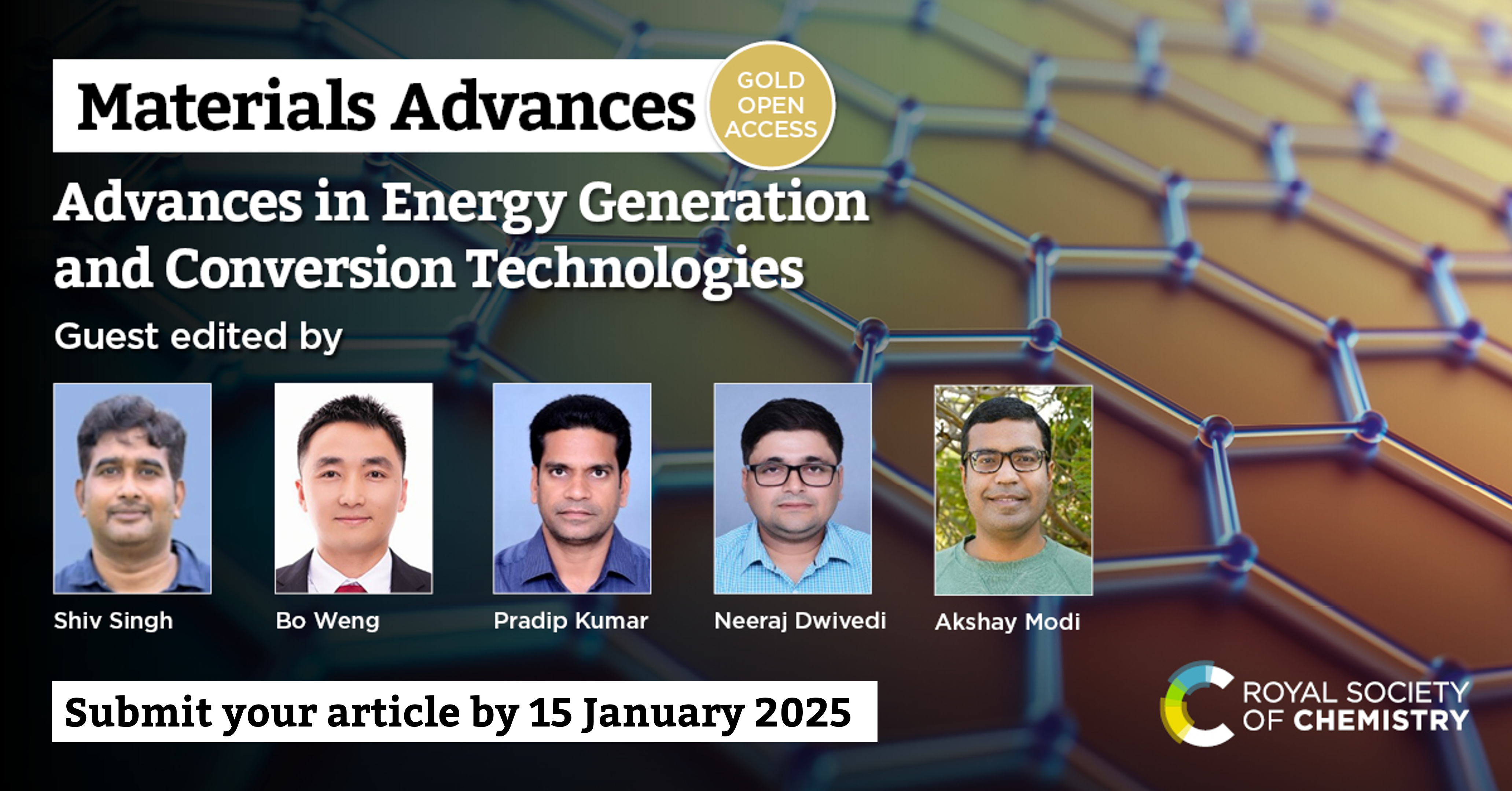We are delighted to announce an open call for papers to our new themed collection on Advances in Energy Generation and Conversion Technologies, to be published in Materials Advances.
In recent years, there have been significant developments in energy generation and conversion technologies that emphasize eco-friendly, low-cost, and sustainable approaches. This themed collection broadly focuses on energy technologies including (but not limited to):
- Advances in microbial fuel cell (MFC) design, operation, and integration with wastewater systems for simultaneous energy generation and pollutant removal.
- Latest battery technology innovations, including solid-state and lithium-sulfur batteries.
- Development of sustainable energy materials from natural and renewable resources, such as cellulose-derived carbon and biopolymers.
- Construction of advanced materials for efficient solar energy conversion, including perovskite cells and solar windows.
- Utilization of carbon-based electrocatalysts derived from waste materials in fuel cells and electrolysers.
- CO2 capture technologies for fuel and material production
- Exploration of hydrogen fuel cells for clean energy in transport and stationary power applications.
- Leveraging graphene, nanomaterials, and metamaterials to enhance energy conversion, storage, and transmission.
Submit before 15 January 2025
If you are interested in contributing to this collection please get in touch with the Editorial Office.
Materials Advances publishes quality research across the breadth of materials science. It received its 2023 impact factor of 5.2 (Journal Citation Reports 2024, Clarivate Analytics).
Please note that accepted manuscripts will be subject to an article-processing charge (APC) unless your institute has an existing agreement with the RSC that covers publications in our gold open access journals. More information about charges, discounts, and waivers are available here. Corresponding authors who are not already members of the Royal Society of Chemistry are entitled to one year’s Affiliate membership as part of their APC. Find out more about our member benefits.
This themed collection is Guest Edited by:
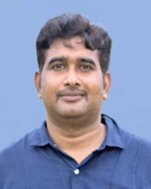 Shiv Singh Shiv Singh
CSIR- Advanced Materials and Processes Research Institute, India ORCID: 0000-0002-4038-5924 Dr Shiv Singh is currently working as Scientist and Assistant Professor at CSIR-AMPRI, Bhopal, India. He received his PhD (2015) in chemical engineering from the Indian Institute of Technology Kanpur, India. He has expertise in the synthesis of novel carbon-based nanomaterials (CNF/CNT/CNP/Graphene/C-dot) for biochemical and energy applications. He did a postdoc at the Korea Institute of Materials Science, South Korea. Currently, he is working on electrode materials for bio/electrochemical reduction of CO2 to value-added products and bio-energy, hydrogen generation and electrochemical sensors. Dr Singh also received Seal of Excellence certificates from Marie Skłodowska-Curie actions call H2020-MSCA-IF-the European Commission and DST INSPIRE faculty award. He is also a community board member of Materials Horizons and early career board member of Nano-Micro Letters. |
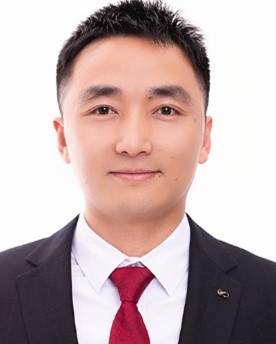
Bo Weng ORCID: 0000-0001-8337-219X Dr Bo Weng is currently a Professor at the Institute of Urban Environment, Chinese Academy of Sciences. He earned his PhD in Physical Chemistry from Fuzhou University, China, in 2018. Following his doctorate, he pursued postdoctoral research at Xiamen University and KU Leuven, supported by the European Union’s Horizon 2020 under Marie Skłodowska-Curie Action (Individual Fellowships) and the Research Foundation-Flanders (FWO) Postdoctoral Fellowships. His research primarily focuses on photocatalysis and (photo)catalytic ozonation for environmental remediation. He has published 72 papers, achieving an h-index of 33 and 4709 citation (Google Scholar). As the first author or corresponding author, he has published 39 papers including Angew. Chem., Adv. Mater., and Nat. Commun. He has been invited to serve as a (Young) Editorial Board Member of NPJ Clean Water (IF 10.4), Chem (IF 19.1), Carbon Energy (IF 19.5),EcoMat (IF 10.4), Nexus, EcoEnergy et al. He also serves as a reviewer of Nat. Water, Nat. Commun., J. Am. Chem. Soc., Angew. Chem., Adv. Mater. et al. |
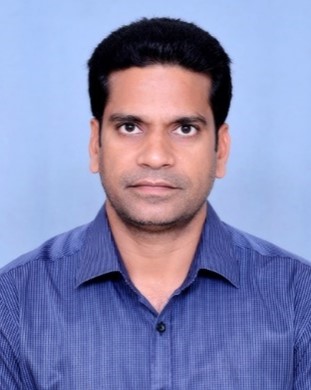 Pradip Kumar Pradip Kumar
CSIR- Advanced Materials and Processes Research Institute, India ORCID: 0000-0002-1996-3697 Dr Pradip Kumar is a Senior Scientist at CSIR-AMPRI, and an Assistant Professor at AcSIR, Bhopal, India. He received his PhD from the School of Physical Sciences, Jawaharlal Nehru University, New Delhi, India. After postdoctoral research at KAIST and KIST, Seoul, South Korea, he joined BARC, Mumbai and Central University of Rajasthan, Ajmer, India as DST Inspire Faculty. His research interest focuses on 2D materials and composites for hydrogen energy storage, thermal management and EMI shielding applications. |
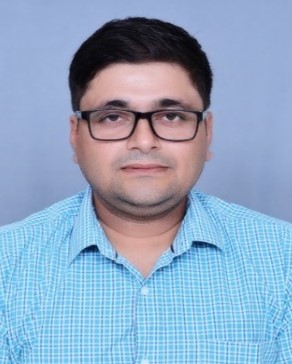 Neeraj Dwivedi Neeraj Dwivedi
CSIR- Advanced Materials and Processes Research Institute, India ORCID: 0000-0003-1232-438X Dr Neeraj Dwivedi is presently a Principal Scientist at CSIR-Advanced Materials and Processes Research Institute, and an Associate Professor at AcSIR, Bhopal, India. He obtained his PhD in 2013 from the Department of Physics, Indian Institute of Technology Delhi, India. He then worked as postdoctoral fellow between 2013 and 2019 at National University of Singapore, Singapore. His research interests include interface engineering, carbon nanocoatings, 2D materials such as graphene-based materials, MXene, metal oxides and nitrides, and polymer-composites for electronic, optoelectronic, energy, sensing and mechanical applications. |
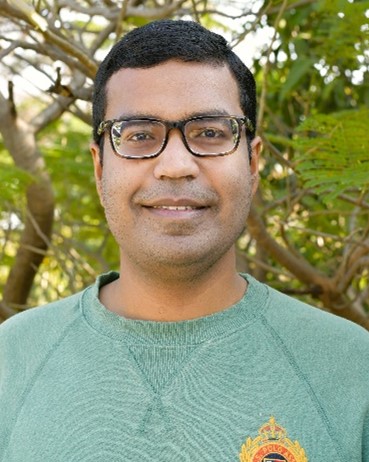 Akshay Modi Akshay Modi
Indian Institute of Science Education and Research Bhopal, India ORCID: 0000-0002-0885-6837 Dr Akshay Modi is an Assistant Professor in the Department of Chemical Engineering at the Indian Institute of Science Education and Research (IISER) Bhopal, Madhya Pradesh, India. His academic journey includes earning a B.Tech. degree in Chemical Engineering from the National Institute of Technology Srinagar, India, in 2013, followed by an M.Tech. degree from the Indian Institute of Technology Kanpur, India, in 2015, and a PhD in Chemical Engineering from the Indian Institute of Technology Bombay, India, in 2020. With a broad spectrum of research interests, Dr Modi specializes in membrane science and technology, nanostructured materials, energy devices, water reclamation, gas separations, and biomedical engineering. Dr Modi has received several awards for his outstanding contributions to research. |


